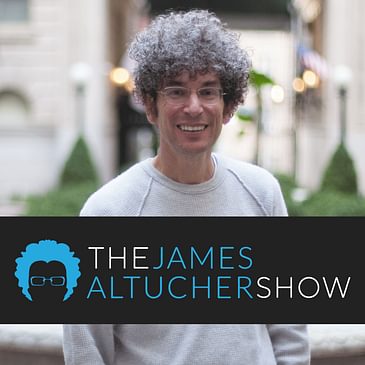A Note from James:
Today, we've got Andrew Gold back on the podcast. He's an investigative journalist and the author of "The Psychology of Secrets: My Adventures with Murderers, Cults, and Influencers" This book is riveting—every page dives into the intriguing world of secrets. What are secrets? What are the big secrets we know of? How do you tell someone’s secrets? From murderers to cults to influencers, Andrew’s insights are fascinating. He also runs the YouTube channel Heretics, which I highly recommend. But for now, let’s get into our conversation about the nature of secrets. Here's Andrew Gold.
Episode Description:
In this episode, James welcomes back investigative journalist and author Andrew Gold to discuss his latest book, "The Psychology of Secrets: My Adventures with Murderers, Cults, and Influencers." Andrew shares his deep insights into the nature of secrets and their impact on our lives. From the hidden doctrines of cults like Scientology to the subtle ways secrets influence our personal relationships, Andrew reveals the psychology behind why we keep secrets and how they shape our behavior. This conversation delves into the interplay between secrecy and storytelling, the social dynamics of secret-keeping, and the ethical dilemmas of radical honesty.
What You’ll Learn:
- The psychological mechanisms behind why people keep secrets and how they affect our mental health.
- The role of secrets in cult dynamics, including how leaders manipulate followers by controlling access to secret knowledge.
- How secrets can both strengthen and destroy personal relationships.
- The ethical considerations and potential consequences of radical honesty.
- The impact of AI and data on uncovering and preserving secrets in the digital age.
Chapters:
01:52 The Fascinating Dynamics of Cults and Influence
02:57 Navigating the Complexities of Public Appearances and Media
05:51 The Ethical Dilemmas and Impact of AI on Truth
25:40 Unveiling the Power of Secrets in Cult Dynamics
39:15 The Enigmatic Influence of Secrets on Society and Individual Psyche
42:18 The Intricacies of Secrecy and Society
43:03 The Evolution of Secrets and Their Societal Impact
45:08 The Power of Secrets in Personal and Social Dynamics
54:56 Exploring the Psychology Behind Sharing Secrets
58:23 The Complex Relationship Between Secrecy, Honesty, and Society
01:06:42 Navigating the Challenges of Content Creation and Audience Expectations
01:17:43 Reflections on the Journey of a Content Creator
Additional Resources:
- Andrew Gold’s YouTube Channel: Heretics
- The Psychology of Secrets on Amazon
- Sam Harris' Book: Lying
- Peter Boghossian’s Work
- Trigonometry Podcast
------------
- What do YOU think of the show? Head to JamesAltucherShow.com/listeners and fill out a short survey that will help us better tailor the podcast to our audience!
- Are you interested in getting direct answers from James about your question on a podcast? Go to JamesAltucherShow.com/AskAltucher and send in your questions to be answered on the air!
------------
- Visit Notepd.com to read our idea lists & sign up to create your own!
- My new book, Skip the Line, is out! Make sure you get a copy wherever books are sold!
- Join the You Should Run for President 2.0 Facebook Group, where we discuss why you should run for President.
- I write about all my podcasts! Check out the full post and learn what I learned at jamesaltuchershow.com
------------
Thank you so much for listening! If you like this episode, please rate, review, and subscribe to “The James Altucher Show” wherever you get your podcasts:
Follow me on social media:




